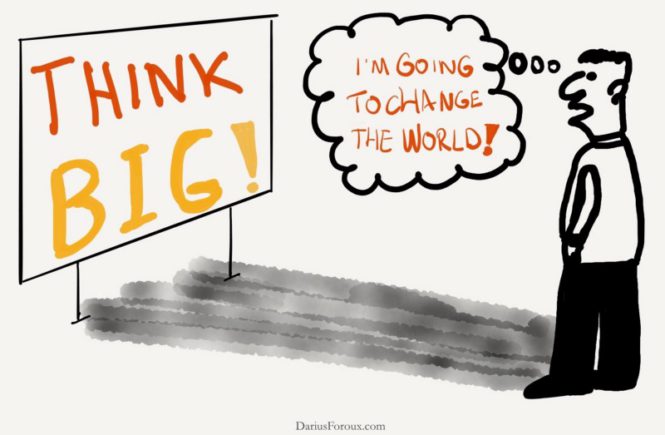We live in interesting times. Technology has made a lot of things possible that we couldn’t think of, just a few years ago.
We all crave innovation, change, and improvement. That’s why ideas, creativity, and knowledge are one of the most important resources in the world.
New apps and services pop up every single day. And it seems like every single one of them is a success.
I often hear people, with big ideas, say: “How difficult is it to come up with a new app? You just need to think big and have a great idea.”
And then they continue: “You hire a freelance developer. Release it. Sell it. And BOOM. Relax on a beach.”
But let’s be real, it’s hard to achieve success. And yet, people think that as long as they have a great idea, they can achieve anything they want.
And it’s not just talking. We genuinely believe that we can become anything we want. We look up to people like Mark Zuckerberg, and we say: “You know he started Facebook from his dorm room, right? And now he’s a billionaire.”
“Or how about the founder of Snapchat, Evan Spiegel? He became a billionaire at age 24. Must be easy.”
A Big Idea Does Not Guarantee Success
I’m not going to tell you that you can’t do something—we already have enough people who do that.
But on the other side of that, we have “thinking big.” However, thinking big can turn around and bite you in the ass. It’s delusional to believe that you can change the world before you’ve worked yourself into a place that makes it possible for you to do so.
We often set out to achieve big things that are unique. Things like, “I want to be the first person who did X.” Or, “I want to be the youngest person who did Y.”
Are we a “genius” now because we have these big ideas?
In his new book, Ego Is The Enemy, Ryan Holiday writes about the dangers of thinking big:
“There is a real danger in believing it when people use the word “genius” — and it’s even more dangerous when we let hubris tell ourselves we are one. The same goes for any label that comes along with a career: are we suddenly a “filmmaker,” “writer,” “investor,” “entrepreneur,” or “executive” because we’ve accomplished one thing? These labels put you at odds not just with reality, but with the real strategy that made you successful in the first place. From that place, we might think that success in the future is just the natural next part of the story — when really it’s rooted in work, creativity, persistence and luck.”
- Are you an entrepreneur if you have one good idea?
- Are you a writer if you published two articles?
- Are you a filmmaker when you create a YouTube video?
When you start thinking like that, you might feel like you’ve already achieved success. The biggest reward for most people is that they can call themselves a “founder,” “owner,” “writer,” or any other title that looks good.
But you’re not your Twitter or LinkedIn bio. No one cares about that stuff — but why do we pursue appearances? It’s often our ego speaking for us.
Look, I’m all about thinking big, but I’m also about being practical.
Because there’s still a difference between doing and dreaming. It doesn’t matter how big your dreams are — if you lose sight of what matters, you might never achieve those big dreams in the end.
Start With Tiny Steps
We live in a sum-sum world, not a zero-sum world. So it’s in everyone’s interest that we have people who set out to change the world. And sure, why can’t you change the world? It doesn’t require any special talent to change the world. It requires hard work and determination.
Thomas Edison put it best:
“There is no substitute for hard work.”
But success is not about a glorious vision. It’s about you, working on your goal—even when no one’s watching. With an emphasis on working because dreaming alone won’t get you anywhere.
In Ego Is The Enemy, Ryan Holiday writes about how we are often our own worst enemy when we think big. He draws lessons from different successful people who have made it big now but didn’t think big before they reached a level of success.
Ryan Holiday writes:
“A few years ago, one of the founders of Google gave a talk in which he said that the way he judges prospective companies and entrepreneurs is by asking them “if they’re going to change the world.” Which is fine, except that’s not how Google started. (Larry Page and Sergey Brin were two Stanford PhDs working on their dissertations.) It’s not how YouTube started. (Its founders weren’t trying to reinvent TV; they were trying to share funny video clips.) It’s not how most true wealth was created, in fact.”
Investor Paul Graham (who funded Airbnb, Reddit, Dropbox, and others), even says:
“The way to do really big things seems to be to start with deceptively small things.”
So, if thinking big isn’t a great strategy, what is?
When I study people who are called “successful”, I don’t see hubris. I see hard work. It’s always about doing the work — not about dreaming big.
People who say that dreaming big, visualization, and hoping for big things to happen is a good strategy, always have something to sell. If that stuff worked, everyone was a millionaire, philanthropist, or a world leader.
Unfortunately, you can’t build anything on your good intentions.
As Henry Ford once said:
“You can’t build a reputation on what you’re going to do.”
Similarly, you can’t get any results by dreaming big and not putting in the work on a daily basis. Because at the end of the day, results matter the most, not words.




